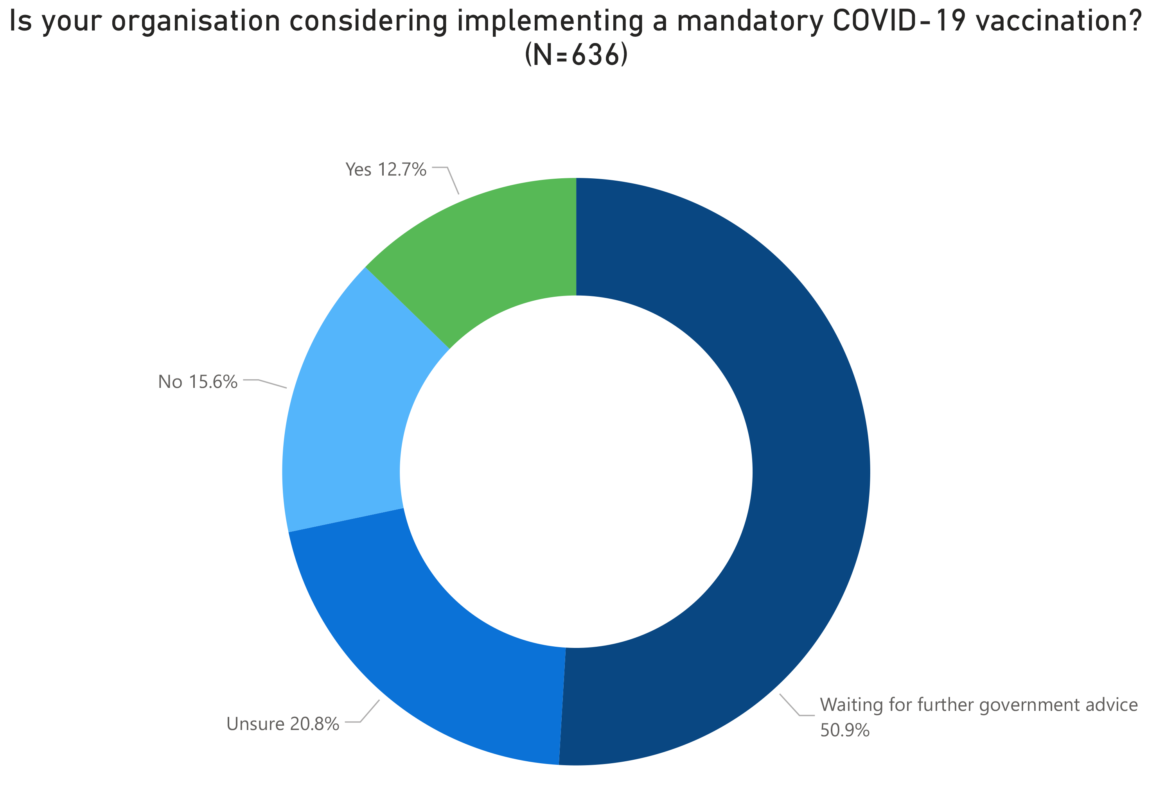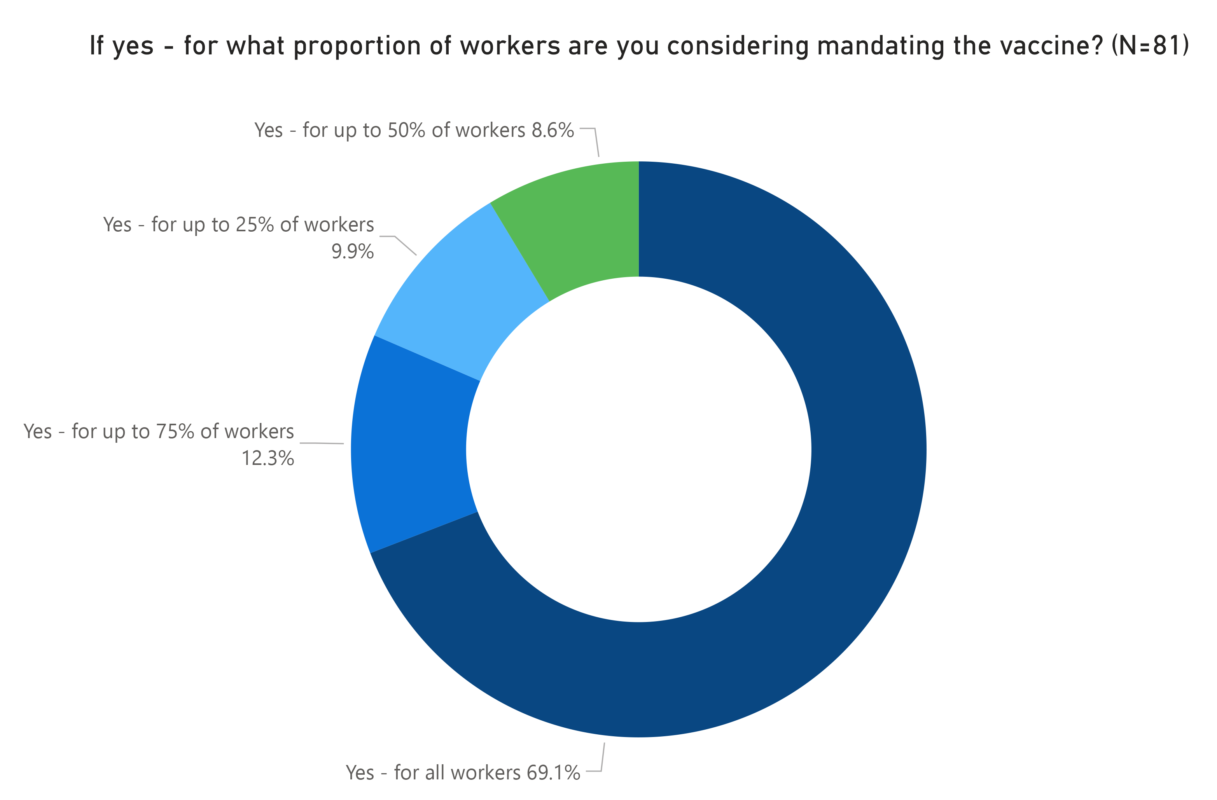New research from the Australian HR Institute shows 13 per cent of employers are considering mandating the COVID-19 vaccine, but the majority want clearer guidelines from the government.
If you’re confused about how to approach the COVID-19 vaccine in the workplace, you’re not alone. After surveying more than 630 HR professionals, academics, HR consultants and executives, the Australian HR Institute (AHRI) found almost 3 in 5 think the lack of government guidelines is causing confusion.
Despite this confusion, 60 per cent are confident their workplace is prepared to act if the government does decide to mandate the vaccine.
AHRI asked respondents to share their thoughts on mandating the vaccine and how they plan to go about developing vaccination processes in the workplace. Here’s what the HR community had to say.
Editor’s update: Yesterday afternoon, after this article was published, employer groups expressed concerns to the federal government and unions regarding liability issues around COVID-19 outbreaks once workplace vaccines are rolled out, the AFR reports. In these talks, IR minister Christian Porter said the federal government would not mandate vaccines in the workplace. States and territories will be left to determine if specific industries should mandate the vaccine.
To mandate or not to mandate, that is the question
COVID-19 vaccines are planned to be rolled out in Australia as of this month, starting with vulnerable workers (those in phase 1A), followed by older Australians and those in at-risk groups (1B). The rest of the population will follow.
(See the government’s roll-out strategy here).
While most people are united around vaccinating vulnerable Australians first and foremost, tensions are surfacing when turning the conversation to workplaces.
“This issue could become contentious in some workplaces. And it’s complicated because it encompasses workplace health and safety, individual health, individual rights as well as employer rights,” says AHRI’s CEO Sarah McCann Bartlett.
Also, the widespread use of a vaccine means different things for different organisations. For some, it’s a matter of principle (‘doing the right thing’ to protect the community) and for others, it’s life or death – just over 30 per cent of respondents told AHRI they currently employ workers who are at a heightened risk of contracting COVID-19 (i.e. they employ health-care or aged care workers).
“I think it is unlikely that the government is going to say that employers should mandate vaccination and those in other sectors shouldn’t – outside of some specific high-risk sectors, such as health and aged care,” says McCann Bartlett.
Half of respondents agree that it’s best to wait for further government advice before making a decision, although 13 per cent reported that their organisation is considering making the jab mandatory. Twenty one per cent are unsure at this stage and 15.6 per cent say they won’t be mandating the vaccine.

Those who are planning on mandating the vaccine were asked how many employees they planned on making this compulsory for. They said:
- For all workers (69.1%)
- For up to 75% of workers (12.4%)
- For up to 50% of workers (8.64%)
- For up to 25% of workers (9.9%)

One survey respondent said: “We will be awaiting further government advice. Without [the] government mandating the vaccine in workplaces, it would probably be difficult for organisations to do so. At the moment, our current view is that it’s up to the individual worker to have/not have the vaccine [and that] any policy [should] be aligned to government direction.”
Another respondent said their workplace was concerned with the potential risks of administering the vaccine, such as any unknown side effects due to the vaccine’s infancy, and this is why they wouldn’t mandate it.
Only 49 per cent of respondents have or plan to consult with their employees on a vaccination policy.
A few respondents said they’d treat it like they do their current flu vaccine policy (which 12 per cent of respondents currently mandate) – strongly advise staff to participate but not force anyone to because “it’s such a personal and cultural choice that is difficult to mandate.”
Another said: “Currently discussing and intending to strongly encourage but not mandate. Tracking or proof of vaccination is another aspect [we’re discussing] as there are differing opinions on whether we should do this or not.”
In the small percentage of those who would mandate, one respondent said: “All our employees will be vaccinated. [We] have discussed it with them and everyone says they want to do it.”
This consultative approach is positive, but it’s not what the majority would do. Only 49 per cent of respondents have or plan to consult with their employees on a vaccination policy.
Mitigating workplace risks
If you are thinking about making vaccines mandatory, McCann Bartlett notes there are plenty of risks employers need to watch out for, including:
- A possible increase in unfair dismissal claims if employees are terminated for refusing to get vaccinated.
- The consequences of an inconsistent approach within sectors or between organisations (i.e. would an employee look to jump ship if they favoured the approach of a different organisation?).
- The long-term damage it could do to an organisation’s culture should employees feel their employers were too heavy-handed or hadn’t communicated sufficiently with them.
In other words, before terminating an employee who refuses to get vaccinated, an employer needs to demonstrate that the vaccination is necessary for the employee to perform the inherent duties of their role safely.
McCann Bartlett stresses that now is the time to brush up on best-practice HR, including creating effective communication protocols, facilitating an environment of feedback, knowing how to set up redeployment opportunities and, as a last resort, understanding your legal obligations around termination.
Doing all this helps to avoid bringing any unnecessary risk onto your business when implementing a COVID-19 vaccine policy.
Clearing up the COVID-19 vaccine confusion
More clarity is likely to come with time – the federal government has started discussions with business and unions on the vaccination program. But until then, AHRI has developed a helpful discussion sheet (exclusive for AHRI members) that collates some of the relevant details that employers need to be aware of (as of 1 February 2021). Please note, as the situation unfolds the advice will change, so think of this as a starting off point.
The discussion sheet includes the current government position, the current legal position, important considerations for employers and tips for setting up a vaccination program at work.
McCann Bartlett also suggests employers do the following:
- Have a clear communication plan in place – “If you are requiring employees to take the vaccine, clearly explain why you’ve made this decision [i.e., they might be exposed to vulnerable citizens, such as the elderly or children] and make sure you give all employees a platform to ask questions and raise any concerns. “You should also avoid being heavy-handed with your approach – this is a scary time for people, so all communication needs to be compassionate,” she says.
- Have a process for multiple outcomes– “You need to have a clear process in place for employees who agree to get the vaccine and also those who refuse. For the latter group, make sure a discussion takes place to ascertain why they’ve refused and what will happen moving forward. That might be an adjustment of their role (i.e. could they work from home exclusively? Could they be redeployed to do non-client/customer/colleague facing work?) or, as a last resort, terminating their employment.”
- Other important considerations – “The federal government said the vaccine will be free for all Australians, so there will likely be no additional out-of-pocket expenses for employers. She also points out that to support your employees and the community, mandatory vaccinations should happen on company time and you should be careful not to direct an employee to use a specific vaccine supplier or administrator of the vaccine.
“Of course, nationally consistent guidelines that can absolutely be relied on, without ambiguity, would be most helpful. Once we receive more general guidance on how to make a decision, and the considerations, professional and industry bodies will be well placed to support their members further. We have access to legal advice, specific expertise and can provide template policies and processes off the back of this further advice.”
What’s your workplace’s stance on mandating the COVID-19 vaccine? Let’s discuss in the comment section below.
The top three industries to respond to AHRI’s survey came from healthcare and social assistance (22 per cent of total respondents), professional, scientific and technical services (12 per cent), and education and training (8 per cent) – and each state and territory was represented.
Head over to AHRI’s COVID-19 resources webpage to access the discussion sheet and to read more helpful resources.


Like the majority of respondents in AHRI’s survey, my workplace is waiting for gov instruction before making any decisions.
While I don’t think it’s feasible to mandate vaccination, I think it is a different concept to have a policy of ”no vaccination, no return to the office” which would align to the current compulsory vaccination of children to attend schools. Similarly with not being being allowed to get on a flight, where vaccination may well become a requirement. Perhaps rather than focusing on mandating vaccination we should think of how smokers are now prevented from smoking in all indoor areas. It then becomes a matter of choice whereby anyone who chooses to not be vaccinated, becomes very limited in… Read more »
I’m amazed that so many are waiting for government advice on this issue – the governments, state and federal, have been far from reliable in terms of the information they have presented and have been heavy-handed in their handling of the issue since day one. I will support my employees to do their own research on the matter and make their own decisions regarding their health and their bodies. There will be no mandating here.
even a government mandate is illegal and doesnt make it ok
Why on Earth are we even considering mandating a rushed, experimental vaccine that the manufacturers state, clearly and publicly, do not stop someone getting sick or transmitting the virus to someone else. So far the only claims being made are that it may reduce severity. Perhaps if there was evidence it was safe and effective at stopping transmission there would be a case of stricter requirements.